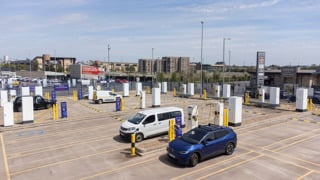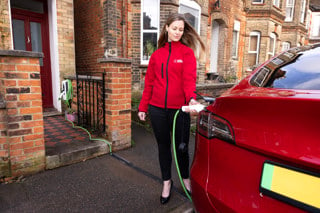Tougher CO2 standards for cars and vans will be introduced to help cut transport emissions and improve air quality in Europe.
They form part of a package of measures announced by the European Commission, which also include fuel efficiency targets for trucks for the first time.
EU member states, including the UK, have committed to a 40% cut in greenhouse gas emissions by 2030, compared with 1990 levels.Reducing emissions from petrol and diesel engines, as well as the widespread adoption of electric cars, are key to achieving those targets.
However, the EC report says infrastructure improvements will also be needed, together with changes to procurement rules for public sector fleets and company car tax to incentivise low and zero emission driving.
Transport commissioner Violeta Bulc said: “Transport accounts for a quarter of Europe’s greenhouse gas emissions and is a main cause of air pollution. The transition to low-emission mobility is essential to reach the EU’s ambitious climate objectives and improve quality of life in cities.”
Manufacturers are already working towards an average new car CO2 target of 95g/km by 2021, and 147g/km for all new vans by 2020. The Commission is now consulting on a new standard for 2030.
Current targets require manufacturers to reduce new car emissions by about 5% per year between 2015 and 2021, and by about 5.5% per year for vans between 2017 and 2020. But, whatever limits are agreed, the report calls for action earlier “rather than later” due to vehicle renewal cycles.
However, it is unclear about the impact on targets of the new real-life testing procedure for fuel efficiency and CO2 emissions which will be implemented for all new cars launched after September 1 next year. The test is expected to result in a 20-30% rise in average emissions, but lobbying by manufacturers could influence those 2030 targets.
Pauline Bastidon, head of European policy at the Freight Transport Association, said: “An effective framework for low emission alternative energy and an adequate roll-out of infrastructure, are key for us and can go a long way in helping the logistics sector reduce its carbon footprint.”
He added: “The Commission needs to ensure that financial instruments providing guarantees to private investors are not the only source of funding available for new technologies.”
The strategy comes in the wake of a hard hitting report from the Institute for Public Policy Research (IPPR). It welcomed the possible expansion of London’s ultra-low emissions zone, announced by new mayor Sadiq Khan, and suggested diesel cars could be phased out altogether.
Harry Quilter-Pinner, researcher at IPPR and co-author of the report Lethal and Illegal, told Fleet News: “ should be ambitious going forward – only bold action will make the capital’s air safe to breathe again. IPPR’s analysis suggests he will ultimately need to completely phase out diesel cars and buses in order to reach legal compliance.”
The think tank commissioned King’s College London to understand the scale of the transformation in road usage required to clean up London’s air.
Researchers looked at an ambitious policy, measuring the impact if the capital returned to the lowest recorded level of diesel car ownership, at around 10% of the car fleet (circa 1995), from the current 57% of cars.
It suggests it would have a significant impact. However, it found a reduction in diesel alone would not allow London to reach legal compliance before 2025.
The inescapable conclusion, says the IPPR report is that, as long as some diesel cars (along with diesel buses, taxis, vans and lorries) remain on London’s roads, it will remain in breach of UK law.
However, it acknowledges this would have an impact on business, given that the light goods vehicle fleet went from 51% diesel in 1994 to 96% in 2014.
Quilter-Pinner said: “With the possibility of recession, this regulation should be less stringent on vans than cars and buses, as punitive charges could have a negative impact on growth.”






















Iain - 18/08/2016 18:33
Whilst I am fairly sure we have been here before with this argument, at what point do these 'think tanks' actually start to address the root cause i.e. congestion! Manufacturers are trying to play their part by producing more efficient engines and adding start stop technology. However, this alone will not resolve the problem which is really all about the free flow of traffic at a reasonable speed and providing adequate parking for those who cannot use public transport, which remains over priced and barely adequate in this century. Traffic sitting idle will always pollute, so lets get serious, address the core issue and stop imposing more regulations and costs on struggling commuters and business.